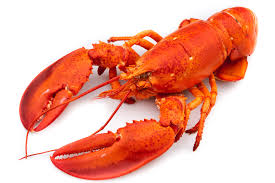记忆方法
lobster音“老不死的”龙虾
中文词源
lobster 龙虾
来自拉丁语locusta,龙虾,蝗虫,词源同locust,langoustine.拼写讹误作lobster,或是有意为之,以与locust相区别。
英语词源
- lobster
-
lobster: [OE] The Latin word locusta denoted both the voracious grasshopper, the ‘locust’, and the ‘lobster’ or similar crustaceans, such as the crayfish (if, as has been suggested, the word is related to Greek lēkan ‘jump’, then presumably the ‘grasshopper’ sense was primary, and the ‘lobster’ application arose from some supposed resemblance between the two creatures).
English has borrowed the Latin word twice. Most recently it came in the easily recognizable guise locust [13], but lobster too goes back to the same source. The radical change of form may be due to the influence of the Old English word loppe ‘spider’ – the Old English precursor of lobster was loppestre or lopystre.
=> locust - lobster (n.)
- marine shellfish, Old English loppestre "lobster, locust," corruption of Latin locusta, lucusta "lobster, locust," by influence of Old English loppe "spider," a variant of lobbe. The ending of Old English loppestre is the fem. agent noun suffix (as in Baxter, Webster; see -ster), which approximated the Latin sound.
Perhaps a transferred use of the Latin word; trilobite fossils in Worcestershire limestone quarries were known colloquially as locusts, which seems to be the generic word for "unidentified arthropod," as apple is for "foreign fruit." OED says the Latin word originally meant "lobster or some similar crustacean, the application to the locust being suggested by the resemblance in shape." Locusta in the sense "lobster" also appears in French (langouste now "crawfish, crayfish," but in Old French "lobster" and "locust;" a 13c. psalter has God giving over the crops of Egypt to the langoustes) and Old Cornish (legast). As slang for "a British soldier" since 1640s, originally in reference to the jointed armor of the Roundhead cuirassiers, later (1660) to the red coat.Sir William Waller having received from London [in June 1643] a fresh regiment of five hundred horse, under the command of sir Arthur Haslerigge, which were so prodigiously armed that they were called by the other side the regiment of lobsters, because of their bright iron shells with which they were covered, being perfect curasseers. [Clarendon, "History of the Rebellion," 1647]
权威例句
- 1. Cut the lobster shells into small pieces with heavy-duty scissors.
- 用粗剪将龙虾壳剪成小片。
- 2. Anton the chef concocts a sensual coupling of lobster and asparagus.
- 厨师安东用龙虾和芦笋搭配,制作出了一道口感很好的菜肴。
- 3. This mad writer kept a lobster as a pet.
- 这个疯狂的作家把龙虾当宠物养。
- 4. I'll broil the lobster.
- 我会把这只龙虾烤着吃。
- 5. I like lobster but it does not like me.
- 我喜欢吃龙虾,但它不适宜于我的健康.

